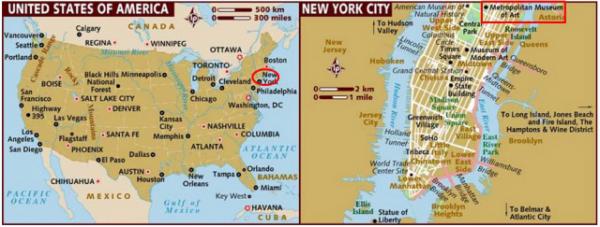2015-02-21

【Aiden in English】
The Metropolitan Museum of Art (MMA) expects more from all visitors. Not only does it have European paintings, but it also dedicates huge museum sections to other cultures. At first, three hours seemed like plenty of time. However, time became an issue after using up two-thirds of that in Greek/Roman Art and European Paintings. MMA's Chinese section looked impressive. My favorite was the Classical Gardens of Suzhou, a replica of a Chinese landscape and courtyard. I have never, ever, ever seen it firsthand before. The experience made me feel very calm. The floor was made of tiles, and the roof was just like the pictures we saw in my Chinese history class at Guang Hua Chinese School in PA. They seemed like bamboo poles strapped together. Statues of Buddha were placed in the center of the wall for meditation. Next to the Great Wave Pavilion, alongside Lingering Garden, was a little lotus pond with golden fish swimming around aimlessly. As we moved on, the Chinese section gave way to the Japanese exhibition. It showed us the traditions of Japanese life. Even though it wasn't as large as the European Paintings, a few certainly stood out. One notable feature on display was a traditional room with a Tatami bed, a common sight in most houses. The Japanese and Chinese sections were much more intriguing than the European section, which we didn't have time to see, in the family-oriented setting. I thought this would make the pictures and information a lot more appealing. This room had a straw-like carpet and a low, but very long and large table; small pillows lined the table's border. They seemed reasonable for sitting and relaxing. Although after living my entire life in tall chairs, everything seemed plain, and they didn't seem to want extreme luxury, large spaces, or to level up. Egypt came to our last stop. The iPod blabbed on about hieroglyphs, and I got lost on the second word. I walked into a replica of a tomb, which wasn't all too impressive to me. When I was eight years old, almost four years ago, I visited Cairo, Alexandria, Sharm el-Sheik, Luxor, Thebes, Aswan, and many other places along the Nile. After a long vacation, I returned with a wealth of eyewitness accounts from St. Catherine Monastery, the Temple of Philae/Abu Simbel/Kom Ombo/Karnak/Luxor/Hathor/Medinet Habu, the Step Pyramid of Djoser, and the Giza Pyramids, among others. When I saw the actual tombs where Pharaohs were buried along the Valley of the Kings and Queens, it seemed too modern; there wasn't much of an ancient feel to it. Walls and hieroglyphs were artificial, too purposefully to be ancient, weren't they? Everyone's different; Confucius said you can't copy something done thousands of years ago. Our visit to the MMA was after a long journey. It gave me a lot of knowledge and a good workout. The world felt brought together here, and every art was mixed under one roof. There will be tons of more stuff for us to explore. Even when all the arts were united in a museum, the world seemed more prominent and significant every second we stayed in the MMA. 【红霞译】
纽约大都会艺术博物馆努力让来访者尽量感受到全球最美的艺术内涵,不仅渲染欧洲艺术展厅,而且还增设其它文化背景。起初我原以为投注三个钟头大把光阴足以遍及所到之处,然而在匆匆涉猎古希腊雕刻、泛泛浏览欧洲绘画之后,才发现三分之二的良辰美景已悄然远去,剩下的时间寥寥无几。 中国展厅印象深刻,苏州古典园林不光成为大都会艺术博物馆中国庭院的突出代表,更是我本人的至爱。尽管我从来、从来没有亲自领略江南风情,但身临这座人工特制的园林之城,令我“不出城郭而获山林之怡,身居闹市而有林泉之乐”。园内地面全部由土砖铺成,天花板看上去跟我在宾州光华中文学校中国历史课上播放的图像一模一样,捆扎成堆的“古”竹参天,正在打禅的佛像高悬正墙中央,“留园”旁“沧浪亭”下小荷花池里金鱼悠闲自得。 离开中国馆后,我们来到隔壁日本展室,这里所有的展品集中再现了东洋人传统生活方式,尽管规模不及欧洲绘画浑厚壮观,但内部打造得短小精悍,令我耳目一新。正厅摆设精巧别致,榻榻米床与常见的完全不同,这也是为什么我格外喜欢中日两国东方艺术所包含的民族气息,因为时间关系未能鉴赏到也许更接地气的西方风俗,所以才觉得只有通过这种视觉效果才能形象地反映出一个国家的文化特征。地板上的草席、低矮细长的大桌、桌边摆放的袖珍枕头,生动营造了日式修身养性的家庭氛围,难怪我老觉得自己的起居方式平淡乏味,莫非因为坐久了高凳,看来不是人人追求高端大气上档次,低调朴实有内涵同样倍受青睐。 古埃及馆是我们最后一站,随身携带的苹果牌多功能媒体解说器一本正经地讲述象形文字,我没听上俩字便开起小差。当走进古墓陵地,我一点也激动不起来。大约四年前我八岁的时候,我曾访问过开罗、亚历山大、沙姆沙伊赫、卢克索、底比斯、阿斯旺及尼罗河畔其它地方,从圣凯瑟琳修道院、菲莱神殿、阿布辛贝神庙、双神金庙、卡纳克综合神殿、卢克索神殿、哈索尔神庙、哈布城陵庙、卓瑟王阶梯金字塔、吉萨金字塔等地度假归来,我收获了许多真知灼见,正因为当时实地参观了帝王谷法老墓地,才觉得眼前展出的模型实在太…太…太现代化,毫无古老悠远之感,围墙石块和象形文字均为赝品,没法与真迹相比。老夫子说过人各有异,几千年前的埃及古迹确实很难复制得惟妙惟肖。 经过辛苦跋涉,本次全部参观行程告一段落,在增长见识的同时,我还不失时机地磨练了体魄。纽约大都会艺术博物馆像一条纽带,把世界各族同胞与艺术联系在一起,为我们深入了解更多更美的文化遗产开辟了一个异彩纷呈的广阔天地。
Today in History(历史上的今天): 2015 Shun Lee West, NYC(初中一年级·纽约顺利西店中餐厅) 2015 Serafina Fabulous Pizza, NYC(初一·纽约塞拉菲娜美味披萨店) 2015 Silk Road Ensemble w/ Yo-Yo Ma(初一·马友友丝绸之路民乐队) 2015 Metropolitan Museum of Art NYC(初一·纽约大都会艺术博物馆) 2011 My Favorite Things about School(二年级·记我喜爱的校日) 学前班·童心绽放(2009 Childlike Enthusiasm)

Asian Art (亚洲艺术 02-21-2015)

Master of the Nets Garden (中国苏州园林 02-21-2015) 
Ming Dynasty-style Garden Court (明朝风格花园庭院) 
Momoyama Culture w/ Lavish Gold Screens & Luxurious Artefacts (桃山文化·奢华的镶金屏风和昂贵的手工艺品 02-21-2015)  Shōin Room w/ Large Alcove (Tokonoma), Grass Mats (Tatami), and Decorated Sliding Doors (Fusuma) for Walls Shōin Room w/ Large Alcove (Tokonoma), Grass Mats (Tatami), and Decorated Sliding Doors (Fusuma) for Walls
(书房·壁龛、榻榻米、拉阖门 02-21-2015)
 Arm & Armor, Main Hall of the Middle Ages Arm & Armor, Main Hall of the Middle Ages
(武器和盔甲·中世纪正殿)
 European Portrait Paintings (欧洲肖像绘画 02-21-2015) European Portrait Paintings (欧洲肖像绘画 02-21-2015)

Wolf & Fox Hunt by Peter Paul Rubens (彼得·保罗·鲁本斯《狼狐狩猎》02-21-2015)  Peter Paul Rubens, Wolf & Fox Hunt, Oil on Canvas, 1616 Peter Paul Rubens, Wolf & Fox Hunt, Oil on Canvas, 1616
(彼得·保罗·鲁本斯《狼与狐狸狩猎》| 1616年布面油画)
 European Landscaping Paintings European Landscaping Paintings
(欧洲风景绘画 02-21-2015)  European Decorative Art (欧洲装饰艺术 02-21-2015) European Decorative Art (欧洲装饰艺术 02-21-2015)
 Charles Engelhard Court (查尔斯·安格哈德大厅) Charles Engelhard Court (查尔斯·安格哈德大厅)
 Modern and Contemporary Art (现代与当代艺术 05-11-1996) Modern and Contemporary Art (现代与当代艺术 05-11-1996)
 Roberto Matta, Watchman, What of the Night (1968) Roberto Matta, Watchman, What of the Night (1968)
(罗伯托·马塔《守望者,黑夜将如何?》 | 1968年创作 05-11-1996)  James Rosenquist, Females and Flowers, Oil on Canvas, 1984 James Rosenquist, Females and Flowers, Oil on Canvas, 1984
(詹姆斯·罗森奎斯特《女性与花卉》| 1984年布面油画 05-11-1996) Crosslinks(相关博文): USA(出游美国) 6th Grade(初中一年级) |
